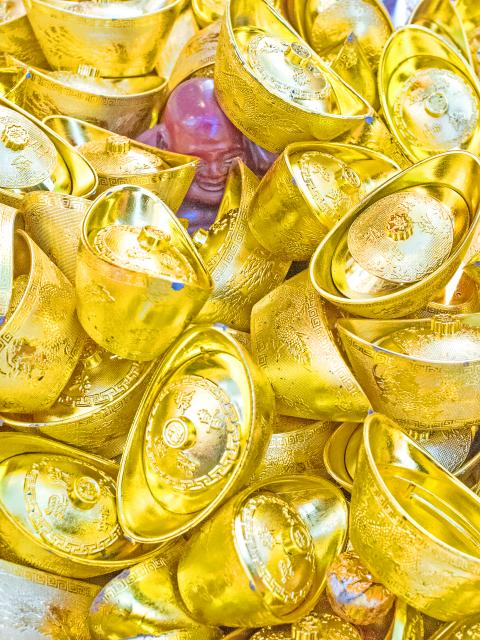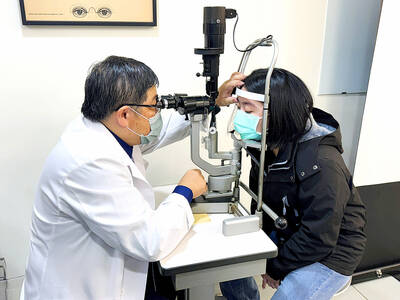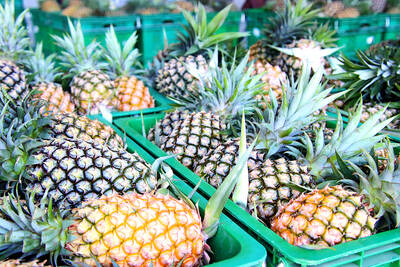Chinese Practice
點石成金
(dian3 shi2 cheng2 jin1)

Photo: Paul Cooper, Taipei Times
照片:台北時報記者古德謙攝
to touch stone and turn it into gold
Midas Touch 原出自希臘神話中的邁達斯點石成金的故事。故事揭示了過度貪婪的下場,並提醒世人,美夢成真時往往會伴隨著意想不到的後果。如今,Midas Touch 這個片語已失去了原本的警世含意,僅用來指某人化腐朽為神奇的能力,例如形容商人非常擅長賺錢。
根據古羅馬詩人奧維德的敘述,佛里幾亞的國王邁達斯因酒神戴歐尼修斯而獲得了一種特殊的能力。一名叫西勒努斯的森林之神喝醉酒迷了路,被幾名農夫送到邁達斯的宮殿。酒神為了回報邁達斯對西勒努斯的照顧,表示將給他一項贈禮。邁達斯因一時的貪念,要求酒神賜予他點石成金的能力。起初一切都很順利,直到他發現,任何他觸碰到的食物和飲料都會變成無法食用的金子。就連他的女兒,也在他伸手安慰她的時候,意外被變成了金子。
中文的「點石成金」與Midas Touch 意思相近。「點石成金」字面的意思是把石頭變成金子。不同於英文的Midas Touch,這個成語並沒有警世的含意,常用於形容人改寫文字的功力極好,能將平淡的文章改為精彩的作品。(台北時報編譯涂宇安譯)
他有點石成金的本領,能把憋腳的打油詩改成洗練的傑作。
(He has the Midas touch. He can transform a pretty basic limerick into a refined masterpiece.)
他不過改了文章第一段的幾個字,便讓整篇文章增色不少,真是點石成金,令人佩服。
(He didn’t just change a few words in the first paragraph, he transformed the entire article. He has the touch. It’s really quite impressive.)
英文練習
The Midas touch
The story of the Midas Touch originates from Greek mythology. It is a cautionary tale of being careful of what you wish for, and of the perils of unchecked greed. In modern usage, it seems to have lost this cautionary aspect, and now simply refers to the ability to transform something pedestrian into something remarkable, for example for a businessperson with a keen eye for turning a profit.
The original myth revolves around Midas, king of Phrygia, whom the Roman poet Ovid says was given a special power by the god Dionysius. The god, grateful for the hospitality Midas had afforded the satyr Silenus, drunk and lost and brought before the king by local peasants, offered Midas a reward. Midas allowed his greed to get the better of him, and requested the ability to turn things into gold. All went well until the king discovered that all the food and drink in front of him was rendered useless at his touch. It was even said that he inadvertently turned his own daughter into gold when he attempted to comfort her.
In Chinese, there is a similar idiom: 點石成金 literally means “to touch stone and turn it into gold.” There is no cautionary aspect to this, and it is often used figuratively to mean transforming crude writing into a work of literary merit.
(Paul Cooper, Taipei Times)
Warren Buffet is a modern Midas. He certainly has the touch.
(巴菲特很懂理財,簡直是現代版的點金術師。)
You really do have the Midas Touch, don’t you. Everything you touch turns into gold.
(你還真會化腐朽為神奇,彷彿會點金術。)

A: Recently, I’ve been seeing mosquitoes flying around in front of my eyes. The doctor said it’s the “flying-mosquito disease.” B: Flying mosquitoes? What a strange name. A: They’re actually called “floaters” in English, meaning floating debris. When fibrous substances in the vitreous body inside the eyeballs increase, floaters can appear in the visual field. B: Oh my goodness. Can you get rid of them? A: According to ophthalmologist Horng Chi-ting’s research, taking the enzymes of certain fruits is likely to help reduce floaters. A: 我最近一直覺得眼前有蚊子飛來飛去,結果醫生說是「飛蚊症」。 B: 飛蚊症?好奇怪的病名。 A: 英文名稱叫「floaters」, 也就是漂浮物的意思。 因為眼球的玻璃體中纖維化物質增多,導致視野出現漂浮物。 B: 天啊!要怎麼把蚊子趕走? A:

In Taiwan, people can use a platform to rent a power washer for a weekend or share unused garage space for someone’s storage needs. These are examples of the sharing economy, a consumption model that has gained widespread adoption worldwide. This approach allows people to rent or share assets like cars, homes or even services, typically through online platforms. This innovative model poses a simple yet powerful question: why purchase infrequently used items when sharing is more practical? By making useful but idle resources accessible, the sharing economy turns them into sustainable opportunities. Internationally, platforms like Airbnb and Uber have popularized

Bilingual Story is a fictionalized account. 雙語故事部分內容純屬虛構。 I stand by the Miluo River as dusk falls. The court betrayal is too much. I served Chu with loyalty. I forged alliances and fought corruption. But the whispers of jealous courtiers, the murmurs of treason, spoke louder. The king cast me out. The water looks calm. It promises peace. I step in. The river is cold against my legs. I hear shouts behind me — fishermen calling my name. I keep walking. The calls grow louder, but I do not turn around. The water rises to my chest. It pulls at me. I

A: What types of fruit enzymes should we take to help reduce eye floaters? B: According to a study published in the “Applied Sciences” journal by Taiwanese ophthalmologist Horng Chi-ting, pineapple, papaya and fig supplements can improve symptoms. A: Pineapples are in season now, so you should munch on more of those to get rid of floaters. B: Not quite. Enzymes can be damaged by our stomach acid if we eat the fruit directly. The doctor says taking fruit enzyme capsules is better for absorption. A: Most importantly, we should reduce our use of personal electronics to prevent floaters from